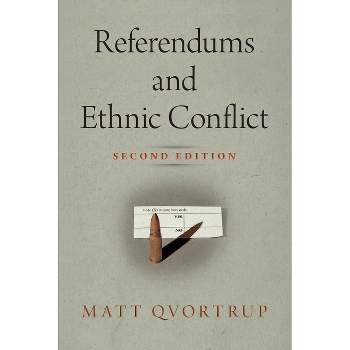Sponsored
Strategic Uses of Nationalism and Ethnic Conflict - by Pål Kolstø (Paperback)

About this item
Highlights
- This book collects 8 thoroughly revised articles and book chapters, together with a new introductory theoretical chapter, based on Pål Kolstø's 30 years of study of nationalism and ethnic conflict in post-Soviet states.
- About the Author: Pål Kolstø is Professor of Russian and post-Soviet Studies at the University of Oslo.
- 294 Pages
- History, Russia & the Former Soviet Union
Description
About the Book
In them, Kolstø examines how the drivers behind ethnic conflicts in the non-Russian republics were not only struggles for collective identities but also more mundane interests, such as competition for jobs and positions.
Book Synopsis
This book collects 8 thoroughly revised articles and book chapters, together with a new introductory theoretical chapter, based on Pål Kolstø's 30 years of study of nationalism and ethnic conflict in post-Soviet states. In them, Kolstø examines how the drivers behind ethnic conflicts in the non-Russian republics were not only struggles for collective identities but also more mundane interests, such as competition for jobs and positions. He also analyses the transformations of Russian nationalism, both among the ruling elite and in the opposition, with a particular focus on the use of symbolism. Exploring nationalism as a pervasive feature of politics in the modern world, Kolstø argues that both state leaders and 'ethnic entrepreneurs' employ nationalist rhetoric and stratagems to further their political agendas and achieve particular goals. He examines some of the ways this is used as a political strategy and focuses both on nationalism at the societal level and as a state strategy.
From the Back Cover
Argues that nationalism and ethnic conflict can be used as strategies to achieve power and influence With a new introductory theoretical chapter, the book collects thoroughly revised nine articles and book chapters based on Pål Kolstø's thirty years of study of nationalism and ethnic conflict in post-Soviet states. Kolstø examines how the drivers behind ethnic conflicts in the non-Russian republics were not only struggle for collective identities but also more mundane interests, such as competition for jobs and positions. He also analyses the transformations of Russian nationalism, both among the ruling elite and in the opposition, with a particular focus on the use of symbolism. Exploring nationalism as a pervasive feature of politics in the modern world, Kolstø argues that both state leaders and 'ethnic entrepreneurs' employ nationalist rhetoric and stratagems to further their political agendas and achieve particular goals. He examines some of the ways this is used as a political strategy and focuses both on nationalism at the societal level and as a state strategy. Pål Kolstø is Professor of Russian and post-Soviet studies at the University of Oslo, Norway.Review Quotes
As a standalone piece of academic research, Kolstø provides us with an excellent insight into the utilitarian and instrumentalist use of nationalist concepts in both Russia and the post-Soviet sphere. From examining the significance of the growing usage of terms such as ruskii (ethnically Russian) instead of rossiskii (civic Russian) in Russian public forums, to the significance and creation of symbols such as the St George's ribbon and march of the Immortal Regiment [...] Although primarily aimed at academics, Kolstø makes the argument of the book accessible, with each chapter building upon and developing the themes of the last. The writing is engaging and at times even unexpectedly witty.
--Jack Cathcart "Nationalism & Ethnic Politics"The monograph by Pål Kolstø is solid and high-quality scientific research that will be useful to social and political scientists.
--Georgi Asatryan "Ethnic and Racial Studies"This book makes one of the most compelling "instrumentalist" contributions to the study of nationalism I have read in years. Pinpointing different ways in which concrete people provoke different forms of ethnic conflict and promote different "ethnic boundaries" between groups, Kolstø illuminates important developments in Eurasia in clear, engaging prose.
--Henry Hale, George Washington UniversityAbout the Author
Pål Kolstø is Professor of Russian and post-Soviet Studies at the University of Oslo. Kolstø specializes in ethnic relations, nationalism and religion in Russia, other former Soviet republics and the Western Balkans. He is the author/editor of ten English-language books on these topics, including The New Russian Nationalism: Imperialism, Ethnicity and Authoritarianism, 2000-2015, 2016, and Russia Before and After Crimea: Nationalism and Identity, 2010-17, 2018, both published by Edinburgh University Press and co-edited with Helge Blakkisrud. His latest monographs are Strategic Uses of Nationalism and Ethnic Conflict: Interest and Identity in Russia and the Post-Soviet Space, Edinburgh University Press 2022, and Heretical Orthodoxy: Lev Tolstoi and the Russian Orthodox Church, 2022.





